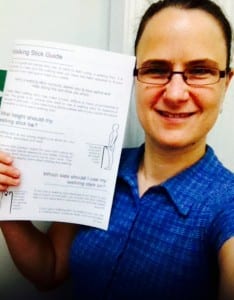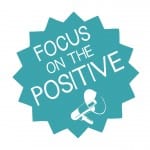Walking sticks: a guide for life
By Lizzy Baddeley, on 20 April 2015
This month, we find out what’s been going on with Roselle Thoreau‘s walking stick project. You can read about Roselle’s participation in Focus on the Positive last January in her previous blog post.
As you can read in my previous post, I work with a lot of older people in my research. I had noticed that many of my participants had started to use walking sticks. When I asked them about their sticks I found that many people had either been given a stick by their children or bought a stick after a fall. None had received any advice on what type of stick they should have.
I did a little research and discovered that badly fitted walking sticks can give people injuries and make it more difficult to walk. People choose to use a walking stick to help them walk and in fact they end up walking less. The problem is that there is very little information out there available to help people learn about stick height, handle and type and the get the right walking stick to meet their needs.
I applied to participate in Focus on the Positive in January 2014 because I thought I could write a guide that would help get the information out to the people who needed it.
My first step was to research what content needed to go into the guide. I searched the literature on walking sticks and spoke to a variety of stakeholders, physiotherapists, accessibility researchers, occupational therapists, as well as stakeholders in disabled and ageing charities.
My second step was to talk to older people to find out what they knew, what they didn’t know and what they wanted to know about walking sticks. I had individual conversations with a dozen older people who used a walking stick and held a focus group with a group of older people who didn’t use walking sticks.
The third step was to create the guide. The first two steps gave me enough information to write the guide. I then gave my content to a designer and together we structured it into an easy-to-read format. This was then shown to various stakeholders for feedback. A few amendments were made to achieve the final product.
The fourth step is publication and advertisement which is ongoing. I approached Rica (formerly Ricability), a disabled and older peoples consumer product watchdog with an Information Standard. They have agreed to publish the guide so that it has an Information Standard logo on it. This means that the guide meets a trusted level of rigour. However, this step is taking some time and I am not sure when Rica will publish the guide.
In the meantime the guide has been printed as it is. This version of the guide is available online, free to download, as well as in print form.
In October 2014, my research team was invited to exhibit our research at Transport for Londons, Access All Areas event at the London Excel Centre. This was a one day event showcasing transport accessibility research and schemes and was attended by approximately 1500 people.
As part of the stand we had, I showcased the guide with a panel display and the guides themselves. My team and I helped many people with their walking sticks that day. So popular was the guide that we had run out of print copies by lunchtime.
I am continuing to give away copies of the guide and talk to people about their walking sticks.
A little project can make a big difference.
What struck me about doing this project is how many people lives I can directly impact. From the moment I started the project I have had people asking for advice. When I initially won Focus on the Positive in January 2014 I was asked by an audience member to give a talk to a local University of the Third Age (U3A) group.
Whilst writing the guide I had a number of colleagues approach me for advice for their parents or grandparents. Upon completion of the guide the Access All Areas event gave me opportunity to disseminate the advice on a large scale.
As a researcher you want your work to make a positive difference. And it does, but making that difference is a long term outcome. With this project I could make a difference almost immediately. And that was gratifying for me and, I hope, helpful for others.
Roselle Thoreau completed her PhD at UCL this year, where she remains an Honorary Research Associate. She is now also a Visiting Researcher at Auckland Transport in New Zealand, where she know lives.
 Close
Close





